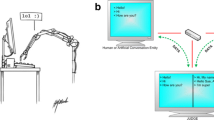Abstract
This paper investigates the role of humor in non-task oriented (topic restriction free) human-computer dialogue, as well as the correlation between humor and emotions elicited by it in users. A joke-telling conversational system, constructed for the needs of this research, was evaluated by the users as better and more human-like than a baseline system without humor. Automatic emotive evaluation with the usage of an emotiveness analysis system showed that the system with humor elicited more emotions than the other one, and most of them (almost 80%) were positive. This shows that the presence of humor makes computers easier to familiarize with and simply makes users feel better. Therefore, humor should be taken into consideration in research on user-friendly applications, as it enhances the interaction between user and system. The results are discussed and our concept of a user-adapted humor-equipped system is presented.
Preview
Unable to display preview. Download preview PDF.
Similar content being viewed by others
References
Cann, A., Holt, K., Calhoun, L.G.: The roles of humor and sense of humor in responses to stressors. Humor 12(2), 177–193 (1999)
Moran, C.C.: Short-term mood change, perceived funniness, and the effect of humor stimuli. Behav. Med. 22(1), 32–38 (1996)
Vilathong, A.P., Arnau, R.C., Rosen, D.H., Mascaro, N.: Humor and hope: Can humor increase hope? Humor 16(1), 79–89 (2003)
Cook, K.S., Rice, E.: Social exchange theory. In: Delamater, J. (ed.) Handbook of social psychology, pp. 53–76. Plenum, New York (2003)
Sprecher, S., Regan, P.C.: Liking some things (in some people) more than others: Partner preferences in romantic relationships and friendships. J. Soc. Pers. Relat. 19(4), 463–481 (2002)
Mulkay, M.: On humor: Its nature and its place in modern society. Basil Blackwell, New York (1988)
Reeves, B., Nass, C.: The media equation: How people treat computers, television, and new media like real people and places. Cambridge Univ. Press, Cambridge (1996)
Higuchi, S., Rzepka, R., Araki, K.: A Casual Conversation System Using Modality and Word Associations Retrieved from the Web. In: Proceedings of the EMNLP 2008, Honolulu, USA, pp. 382–390 (2008)
Dybala, P., Ptaszynski, M., Higuchi, S., Rzepka, R., Araki, K.: Humor Prevails! - Implementing a Joke Generator into a Conversational System. In: Wobcke, W., Zhang, M. (eds.) AI 2008. LNCS (LNAI), vol. 5360, pp. 214–225. Springer, Heidelberg (2008)
Yoshihira, K., Takeda, T., Sekine, S.: KWIC system for Web Documents (in Japanese). In: 10th Annual Meetings of the Japanese Association for NLP, pp. 137–139 (2004)
Ptaszynski, M., Dybala, P., Shi, W., Rzepka, R., Araki, K.: Disentangling emotions from the Web. Internet in the service of affect analysis. In: KEAS 2008, Nagaoka, Japan, pp. 51–56 (2008)
Sugiyama Lebra, T.: The Japanese Self in Cultural Logic. Univ. of Hawaii Press (2004)
Schwarz, N., Clore, G.L.: Mood, misattribution, and judgments of well-being: Informative and directive functions of affective states. J. Pers. Soc. Psychol. 45, 513–523 (1983)
Jiao, J., Xu, Q., Du, J.: Affective Human Factors Design with Ambient Intelligence. In: HAAI 2007, pp. 45–58 (2007)
Author information
Authors and Affiliations
Editor information
Editors and Affiliations
Rights and permissions
Copyright information
© 2009 Springer-Verlag Berlin Heidelberg
About this paper
Cite this paper
Dybala, P., Ptaszynski, M., Rzepka, R., Araki, K. (2009). Humorized Computational Intelligence towards User-Adapted Systems with a Sense of Humor. In: Giacobini, M., et al. Applications of Evolutionary Computing. EvoWorkshops 2009. Lecture Notes in Computer Science, vol 5484. Springer, Berlin, Heidelberg. https://doi.org/10.1007/978-3-642-01129-0_51
Download citation
DOI: https://doi.org/10.1007/978-3-642-01129-0_51
Publisher Name: Springer, Berlin, Heidelberg
Print ISBN: 978-3-642-01128-3
Online ISBN: 978-3-642-01129-0
eBook Packages: Computer ScienceComputer Science (R0)




